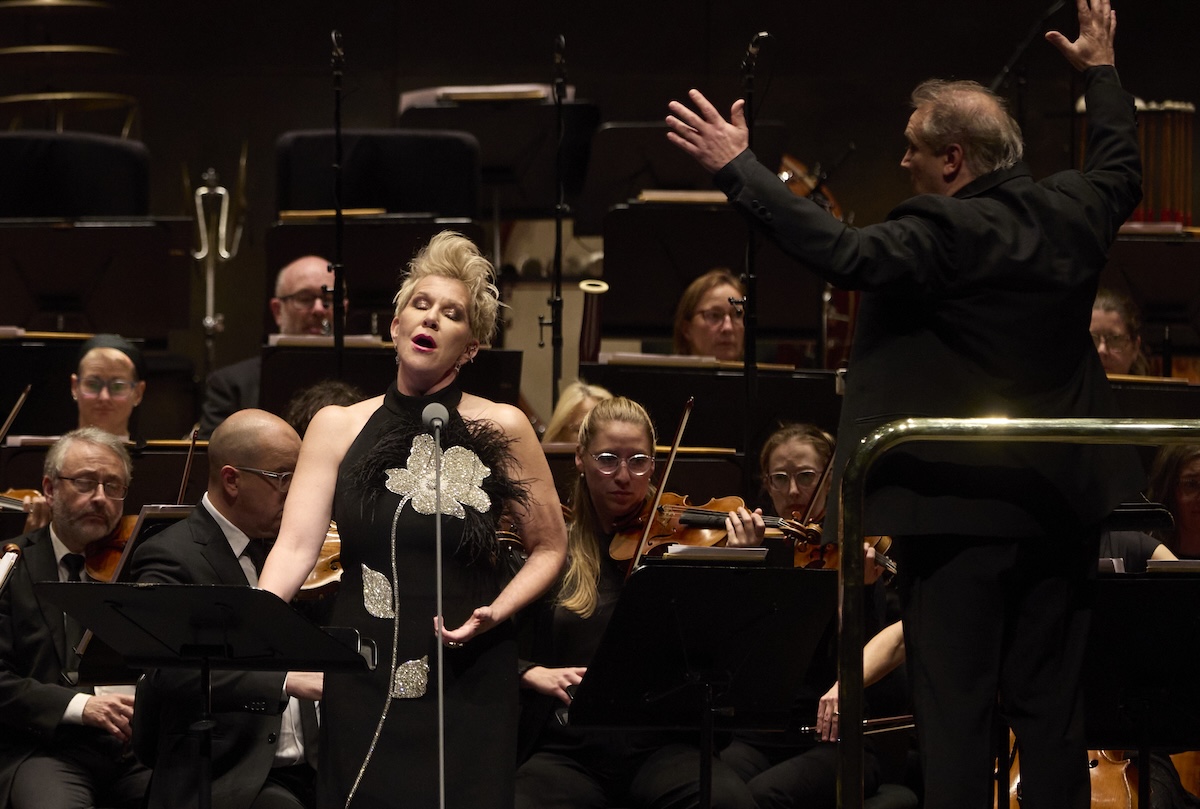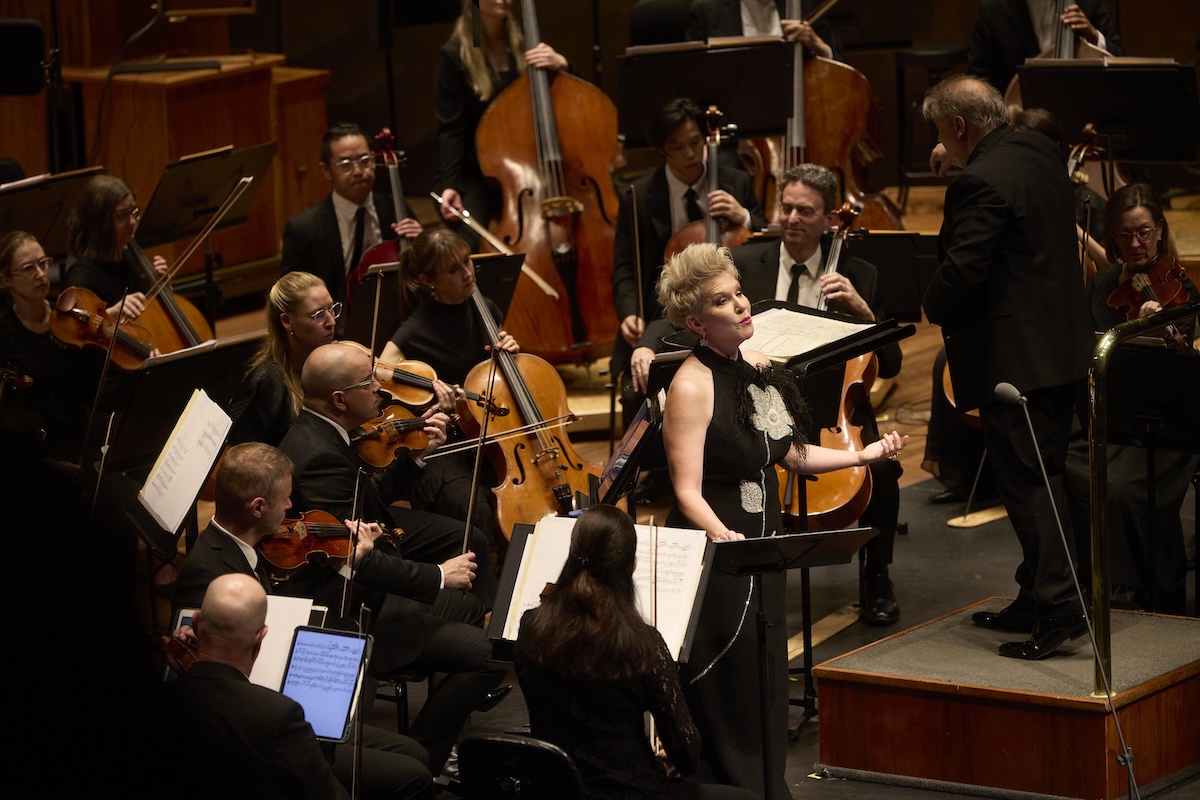In a special performance featuring acclaimed American mezzo-soprano Joyce DiDonato in her Melbourne debut, the MSO Ryman Health Care Spring Gala offers a stirring reminder of music’s restorative power to uplift the spirits and serve as a genuine tonic for modern mental wellbeing. Bringing together Rossini, Berlioz and Respighi in a sequence as theatrically vivid as it is musically nourishing, the gala enraptures with colour, drama and emotional contrast.
Opening with Rossini’s William Tell Overture – that familiar multi-sectioned showpiece composed in 1829 for the last of the composer’s 39 operas – the MSO delivers a superb reading with astutely contoured phrasing and attention to detail under Chief Conductor Jaime Martín.

Chief Conductor Jaime Martín and the Melbourne Symphony Orchestra. Photo © Laura Manariti
Fine-grained playing from the cellos glows in the delicate ‘Dawn’ introduction, with principal cellist David Berlin providing especially sensitive highlights. The subsequent ‘Storm’ section erupts with thrilling precision: brass injections are decisive, timpani strikes threatening, and the strings maintain clarity at full throttle, building to the type of magnificent crescendo Rossini was famed for.
In the pastoral calm that follows, principal horn Nicolas Fleury leads with a beautifully relaxed solo before the famous galloping finale is dispatched with rhythmic discipline and careful exuberance – accompanied by the small joy of watching the bows dance on the strings.
The overture’s buoyancy softens into introspection after the percussionists and brass players clear the stage for DiDonato’s arrival in Berlioz’s Les nuits d’été – an exquisitely orchestrated cycle of six poems by Théophile Gautier, completed in 1841, reflecting on love, loss, longing and renewal.

Joyce DiDonato, Chief Conductor Jaime Martín and the Melbourne Symphony Orchestra. Photo © Laura Manariti
Wearing a black halter-neck gown adorned with a shimmering floral motif, DiDonato stands poised and grounded, head high and one hand resting lightly on the music stand, as if absorbing the text’s essence and transforming it into emotional honesty.
In Villanelle, a momentary tentativeness gives way to articulation that sparkles and a heart that opens to perfectly match the orchestral spring-like colours. It is, however, in the cycle’s more sombre songs that DiDonato’s artistry attains its deepest resonance. Le spectre de la rose unfolds in a surreal hush, her floating pianissimos suspended with remarkable control. Sur les lagunes reveals the full dramatic weight of her voice, its rich, darkened timbres poignantly rendering the grief-stricken text. Every nuance leaves a palpable impression, yet the cycle closes with spirited resolution in L’Île inconnue, where DiDonato’s brightened tone hints at renewal.
Elegant phrasing, molten legatos, impeccable diction and expressive clarity characterise DiDonato’s performance, and Martín and the MSO meet her with equal sensitivity — the winds in particular underlining the piece with subtlety and pliancy, helping magnify the music’s introspective atmosphere.
DiDonato’s rapport with the audience is warm and spontaneous. Expressing her delight at being “in this beautiful corner of the world,” she jokes about wanting to greedily sing more. For her first encore – Bizet’s Habanera from Carmen – she showcases a sultry lower register and seasoned dramatic flair, curious timing given that celebrated Australian soprano Danielle de Niese is currently starring in the role just across the river in Opera Australia’s season of Carmen.
DiDonato’s second encore, Over the Rainbow, serves as a sweet acknowledgement of her finally being “down in Oz.” Sung with luminous simplicity, it feels as though she were gently lifting the audience skyward and inviting each listener along on their own quiet journey.

Joyce DiDonato, Chief Conductor Jaime Martín and the Melbourne Symphony Orchestra. Photo © Laura Manariti
After the interval – DiDonato’s performance still resonating large – the orchestral spotlight shifts to two of Respighi’s vivid tone poems: Fountains of Rome (1916) and Pines of Rome (1924). Respighi was a pupil of Rimsky-Korsakov in St Petersburg, and these pieces demonstrate his superb craftsmanship that incorporates diverse styles. Under Martín’s calmly authoritative direction, the MSO creates impressionistic tableaux that capture Respighi’s cinematic imagination with arresting clarity.
Both works consist of four parts. Fountains of Rome begins with glinting soft string tremolos and radiant woodwind lines in The Fountain of Valle Giulia at Dawn, evoking early morning mist. As the movements progress to the Triton, Trevi and Villa Medici fountains, Respighi’s hallmark orchestral extravagance blooms — gleaming brass, vibrant percussion and a wealth of sumptuous details, including from the harp (principal Yinuo Mu) and celeste (guest musician Aidan Boase), produce textures both monumental and delicately illuminated.
For the gala’s closing work, Pines of Rome, the MSO heralds the suite’s grandeur without sacrificing its many fine details. The Pines of the Villa Borghese exudes youthful exuberance, while The Pines of the Janiculum offers a moment of translucent stillness, featuring a beautifully meandering clarinet solo from associate clarinettist Philip Arkinstall before the recorded nightingale call – the first-ever use of a pre-recorded sound in a musical score – casts its magic over the hall.
The final Pines of the Appian Way builds from an ominous whisper into a wondrous soundscape, its relentless onward march not unlike Ravel’s Boléro (composed two years later in 1928) concluding with bursting brass in a crescendo that is tightly controlled yet irresistibly powerful, bringing the evening to an electrifying close.
From energetic Rossinian richness to Berliozian introspection and Respighian spectacle, the pairing of MSO’s refined musicianship and Joyce DiDonato’s vocal artistry makes this an evening in which orchestral colour, emotional depth and virtuosic performance converge splendidly – a potent dose of musical medicine.
Melbourne Symphony Orchestra and Joyce DiDonato perform the Ryman Healthcare Spring Gala on Saturday 22 November.











Comments
Log in to start the conversation.